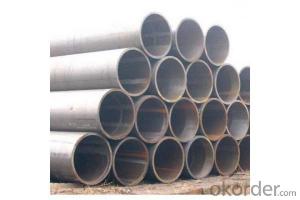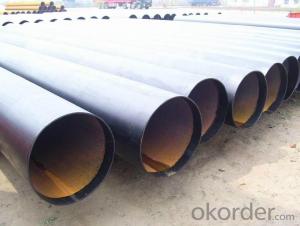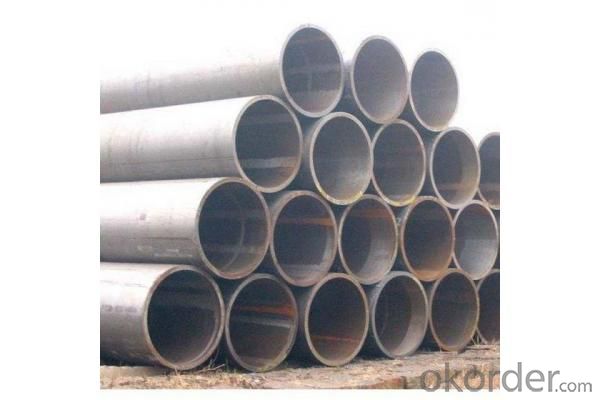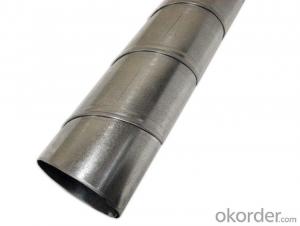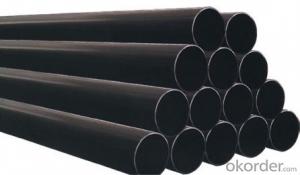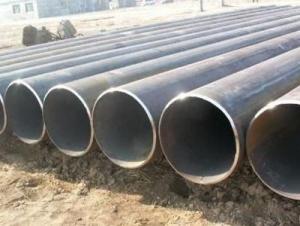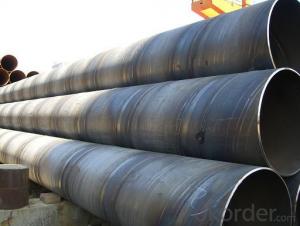API SSAW LSAW CARBON STEEL PIPE LINE OIL GAS PIPE 32'' 48'' 56'' 60''
- Loading Port:
- Tianjin
- Payment Terms:
- TT OR LC
- Min Order Qty:
- 5 m.t.
- Supply Capability:
- 3000 m.t./month
OKorder Service Pledge
OKorder Financial Service
You Might Also Like
Packaging & Delivery
Packaging Detail: | standard export packing or as customer's requirement |
Delivery Detail: | within 10 - 30 days |
Specifications
Spiral Welded Steel Pipes and Tubes
1.Material:Q195-Q235
2.Length:1-12m
3.WT:1.0-14mm
4.O.D.:20-273mm
Spiral Welded Steel Pipes and Tubes
Product Description:
1.Material : Q235,Q345,L245,L290,L360,L415,L450,L485,GrB,X42,46,X52,X56,X60,X65,X70,X80,X100
2,Standard: SY/T5037-2000,GB/T9711-2011,API Spec 5L PSL1/PSL2,ASTM A252\A53,ISO3183,DIN17172,EN10217,JIS G3457,AWWA C200,ASTM A139,ASTM A671,ASTM A672
3.Wall thickness: 3.0mm-30mm
4.Outer diameter: φ168mm-3020mm
5,Length: 5m-12m or as your requirement
6,Corrosion protection standard: DIN30670,DIN30671, AWWAC210, AWWA C203, SY/T0413-2002,SY/T0414-2002
7,Application: Oil, gas, natural gas, water pipe, thermal electricity pipe, steel structure engineering, etc
Q195-q345 Material Steel Pipe's Materials
Elements | Chemical Compsition% | Mechanical Property | ||||||
C% | Mn% | S% | P% | Si% | Yield Point (Mpa) | Tensile Strength(Mpa) | Elongation | |
Q195 | 0.06-0.12 | 0.25-0.50 | <0.050< span=""> | <0.045< span=""> | <0.030< span=""> | >195 | 315-430 | 32-33 |
Q215 | 0.09-0.15 | 0.25-0.55 | <0.05< span=""> | <0.045< span=""> | <0.030< span=""> | >215 | 335-450 | 26-31 |
Q235 | 0.12-0.20 | 0.30-0.70 | <0.045< span=""> | <0.045< span=""> | <0.030< span=""> | >235 | 375-500 | 24-26 |
Q345 | <0.20< span=""> | 1.0-1.6 | <0.040< span=""> | <0.040< span=""> | <0.55< span=""> | >345 | 470-630 | 21-22 |
Packaging & Delivery
Packaging Detail: | Normal exporting packing,in container or bulk vessel or as per clients' request |
Delivery Detail: | 2 months after confimed contract |
Specifications
Large Diameter API 5L X70 PSL2 LSAW Steel Pipe
Grade: X42, X46, X50, X52, X60, B, C
OD: 1.5"-28"
WT: SCH10-SCH160
Large Diameter API 5L X70 PSL2 LSAW Steel Pipe
Specifications:
u Standard: API 5L
u Grade: B, C, X42, X46, X50, X52, X56, X60, X65, X70, X80
u OD: 1.5"-28"
u WT: SCH10-SCH160
u Length: 5-12m
u Ends Finish: plain end, bevel end, grooved end
u Surface Treatment: bare, black varnished, oiled finish, red color, anti-corrosion, 3PE, FBE or epoxy coating
u Technique: hot rolled or cold drawn
u Application: api 5l steel pipe for conveying oil, water, gas
u Invoicing: based on theoretical weight or actual weight
u Payment Terms: L/C at sight, T/T or Western Union
u Trade Terms: FOB, CFR, CIF
u Certification: ABS manufacturing assessment, ABS design assessment, API 5CT, API 5L, DNV manufacturer certificate, ISO9001 quality management system certificate, ISO14001 environment management system certificate, GB/T28001 occupational health and safety management system certificate, A1 class manufacturing license of special equipment certificate, CCS, GL, LR, SGS, TüV, PDE
- Q: What are the factors that affect the price of steel pipes?
- There are several factors that can affect the price of steel pipes. Some of the key factors include the cost of raw materials such as iron ore and steel scrap, market demand and supply dynamics, production and transportation costs, tariffs and trade policies, currency exchange rates, and overall economic conditions. Additionally, factors like technological advancements, environmental regulations, and changes in industry standards can also impact the pricing of steel pipes.
- Q: Material of welded steel pipe
- GB/T3091-1993 (galvanized steel pipe for low pressure fluid delivery). Mainly used to transport water, gas, air, oil and heating, hot water or steam, etc. generally lower pressure fluid and other use tube. Its representative material is Q235 grade a steel.
- Q: Which is more load-bearing, the same thickness of steel pipe and steel bar?
- The same length, the same pipe diameter, the same material strength is hollow, the ratio of area of steel (solid), and the cyclical and slender radius smaller than the larger, so the longitudinal stability coefficient is smaller, three factors, two factors are weak in steel reinforced, another factor: strength, they are the same, no doubt, steel reinforced bearing less than.
- Q: How are steel pipes used in the automotive exhaust systems?
- Steel pipes are commonly used in automotive exhaust systems because steel is a durable and heat-resistant material. Steel pipes are used to transport the exhaust gases from the engine to the muffler and tailpipe, ensuring that the gases are safely and efficiently expelled from the vehicle. These pipes are designed to withstand high temperatures, corrosion, and vibration, making them an essential component in the exhaust system.
- Q: What are the uses of welded steel pipes?
- It is used to transport water, gas, air, oil and heating steam, and generally lower pressure fluid and other purposes of welded steel pipe. The wall thickness of the steel pipe is divided into ordinary steel pipe and thickened steel pipe. The end of the pipe is divided into non - threaded steel pipe (light pipe) and threaded steel pipe. The specification of steel pipe is expressed by nominal caliber (mm). The nominal diameter is the approximate value of the inner diameter. Usually used in inches, such as 11/2. The welded steel pipe for low pressure fluid transportation is used as the main pipe of galvanized steel pipe for low pressure fluid transportation except for directly conveying fluid
- Q: What steel pipes are buried for outdoor heating pipes? Seamless or welded tube? Are there any rules for specific countries? Can use the seamed tube?
- Where outdoor heating pipes are buried, what steel pipe shall be referenced by the 11.1.2 code for installation of outdoor piping?:This chapter applies to the quality inspection and acceptance of the outdoor heating pipe network installation of the plant and the civil building group (residential area) with the saturation steam pressure not greater than 0.7MPa, and the hot water temperature not exceeding 130 degrees celsius.
- Q: How do steel pipes handle high-velocity flow?
- Steel pipes are highly capable of handling high-velocity flow due to their inherent strength and durability. The robustness of steel allows it to withstand the pressure exerted by the high-velocity flow, minimizing the risk of deformation or failure. Additionally, steel pipes have smooth interiors, which reduces frictional losses and ensures efficient flow rates even at high velocities.
- Q: Seamless steel pipe 8162 and 8163 what is the difference?
- 8163 GB is fluid delivery tube, need to use eddy current detection, fluid transport, liquid, gas, solid, such as natural gas, water, gas, coal and stone, 8162 and 8163 of the popular point that is 8163 more than 8162 senior, 8163 inspection, 8162 inspection. I hope you understand!
- Q: Galvanized steel pipe in addition to good rust resistance, what are the advantages?
- First, the surface of the steel pipe is treated by embroidery, which is more durable, not faster than the rapid oxidation, and will not form white rust on the steel tube;Two. The steel pipe is fully protected. After heating, each part of the steel pipe is plated with zinc, and the concave convex part is protected;
- Q: What's the difference between No. 20 steel pipe and 27SiMn Steel Pipe?
- 20# steel pipe material is 20 steel, generally 20 seamless steel pipe, 20# steel pipe material is: high quality carbon structural steel
Send your message to us
API SSAW LSAW CARBON STEEL PIPE LINE OIL GAS PIPE 32'' 48'' 56'' 60''
- Loading Port:
- Tianjin
- Payment Terms:
- TT OR LC
- Min Order Qty:
- 5 m.t.
- Supply Capability:
- 3000 m.t./month
OKorder Service Pledge
OKorder Financial Service
Similar products
Hot products
Hot Searches
Related keywords
